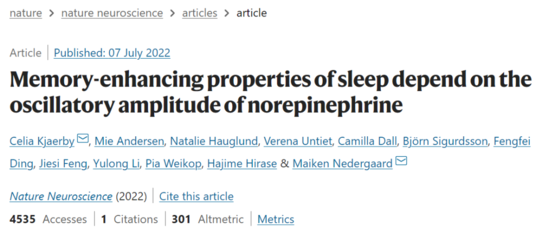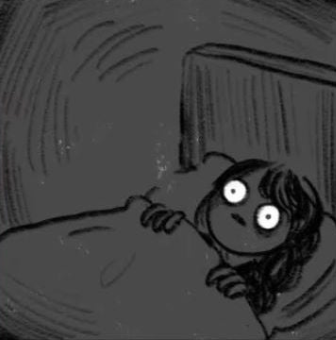Late at night, you wake up from sleep and the alarm says 2:56. Waking up at this o’clock means you’ll have to drink a lot of coffee in the morning to stay awake. What makes waking up in the middle of the night so annoying is because most of us believe that high-quality sleep should be uninterrupted until dawn.
A new study from the University of Copenhagen, however, shows that norepinephrine acts as a stress sensor and can wake you up many times a night – but don’t worry, it’s really quite normal. Norepinephrine is an adrenaline-related stress hormone and transmitter substance involved in the body’s fight-or-flight response. Norepinephrine increases when a person experiences stress and also helps maintain focus .

webpage Screenshot
Many people think of sleep as a continuous state—either slumbering or awake, but sleep is actually much more than it appears on the surface. Norepinephrine can cause a person to be awakened more than 100 times a night, but all during perfectly normal sleep. Although academically speaking, the brain is aroused, because during these very brief moments, the brain’s activity behaves in the same way as it does when awake. But it’s not really awake, because the moment is so brief that the sleeping person won’t notice it at all.

Sleep is actually much more than it appears to be | Giphy
The researchers carried out experiments in mice and believe the findings have the potential to be further translated into studies in humans. Because they were concerned with basic biological mechanisms—that is, mechanisms common to all mammals. The new findings help us understand what happens in the brain during sleep.
The researchers found that very brief awakenings during sleep are caused by fluctuations in norepinephrine, which is also important for memory. A brief awakening resets the brain so that when you go back to sleep, the brain is ready to store memories.
The researchers inserted a microscopic optical fiber made of glass and genetically manipulated “photoreceptors” into the brains of test mice, and connected the fiber and LED light source to the cable. They measured norepinephrine levels in these mice while they slept and compared it to electrical activity in the brain. The researchers then performed memory tests using the implanted device to increase the amplitude of norepinephrine fluctuations, improving the animals’ memory.
Previous research has shown that norepinephrine is associated with stress and is inactive during sleep. However, this new study shows that when we sleep, the levels of norepinephrine in our bodies increase and decrease in waves. High levels of norepinephrine mean the brain is briefly awake, while low levels of norepinephrine mean sleep. That said, norepinephrine levels and levels of “awakening” are linked and constantly changing.
The two most awake peak states were separated by about 30 seconds, and the deeper the trough state, the better the sleep, and the higher the subsequent peaks, the higher the degree of awakening. This shows that even waking up in the middle of the night shouldn’t be too much of a worry. Of course, prolonged insomnia isn’t good, but the study suggests that short awakenings, a natural part of memory-related sleep stages, may even mean you’re sleeping well.

Brief awakenings, a natural part of memory-related sleep stages, may even mean you slept well
Sleep is good for us in many ways—it removes waste, prevents Alzheimer’s, and improves our memory, the last of which was the focus of this study. The results showed that the mice with the most troughs in norepinephrine levels also had the best memory.
During the experiment, the mice sniffed two identical objects and then went to sleep. After waking up, the mice were retouched with the previous study object, however, one of the two objects had been replaced with a new one. Mice with higher numbers of norepinephrine troughs during sleep were more likely to be curious about new objects, suggesting that they remembered objects differently from the last time they saw them.
In addition to increasing our understanding of the mechanisms of sleep, the new study sheds light on antidepressant research.
Some forms of antidepressants increase the level of norepinephrine in the body, which makes it easier to reduce deep sleep. This work suggests that this may also affect memory. Scientists will continue to focus on how different types of drugs regulate the levels of norepinephrine in the body, and will focus on developing drugs that do not affect norepinephrine fluctuations during sleep.
references
[1] https://ift.tt/9kdWZEw
[2] Kjaerby, C., Andersen, M., Hauglund, N. et al. Memory-enhancing properties of sleep depend on the oscillatory amplitude of norepinephrine. Nat Neurosci (2022). https://ift.tt/dPAWDmH
Compilation: Oasis
Editor: Jin Xiaoming
Typesetting: Yin Ningliu
research team
Corresponding author Maiken Nedergaard: Academician of the Royal Danish Academy of Sciences, Academician of the European Academy of Sciences, Center for Translational Neuromedicine, University of Copenhagen, Denmark, and Translational Center for Neuromedicine, University of Rochester, USA
Group homepage
https://ift.tt/G2W0KBv
First author Celia Kjaerby: Associate Professor, Centre for Translational Neuromedicine, University of Copenhagen, Denmark
Paper information
Published the journal Nature Neuroscience
Posted July 7, 2022
Paper title Memory-enhancing properties of sleep depend on the oscillatory amplitude of norepinephrine
(DOI: https://ift.tt/zNsVUHO)
The Future Light Cone Accelerator is an early-stage technology entrepreneurship accelerator initiated by Nutshell Technology. It provides proposals for scientists in different stages of entrepreneurship, ranging from company registration, intellectual property rights, to financing needs, and team formation. Accelerate the transformation of scientific and technological achievements from the laboratory to the market, and accelerate the iteration of some scientists to become CEOs.
The Nutshell team has 12 years of experience in serving scientists. We always make suggestions from the perspective of scientists and be good friends of science and technology creators. If you are planning to start a technology business, whether you are looking for money, people, resources, or orders, you are welcome to chat with the Future Light Cone team. You can send bp or other project information to [email protected] , and leave your contact information, or add the Wechat of Guoke Hard Technology Enterprise to communicate by private message.

✦
✦
Click to read the original text to view the original paper
This article is reproduced from: http://www.guokr.com/article/461888/
This site is for inclusion only, and the copyright belongs to the original author.